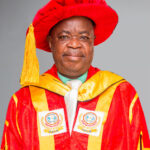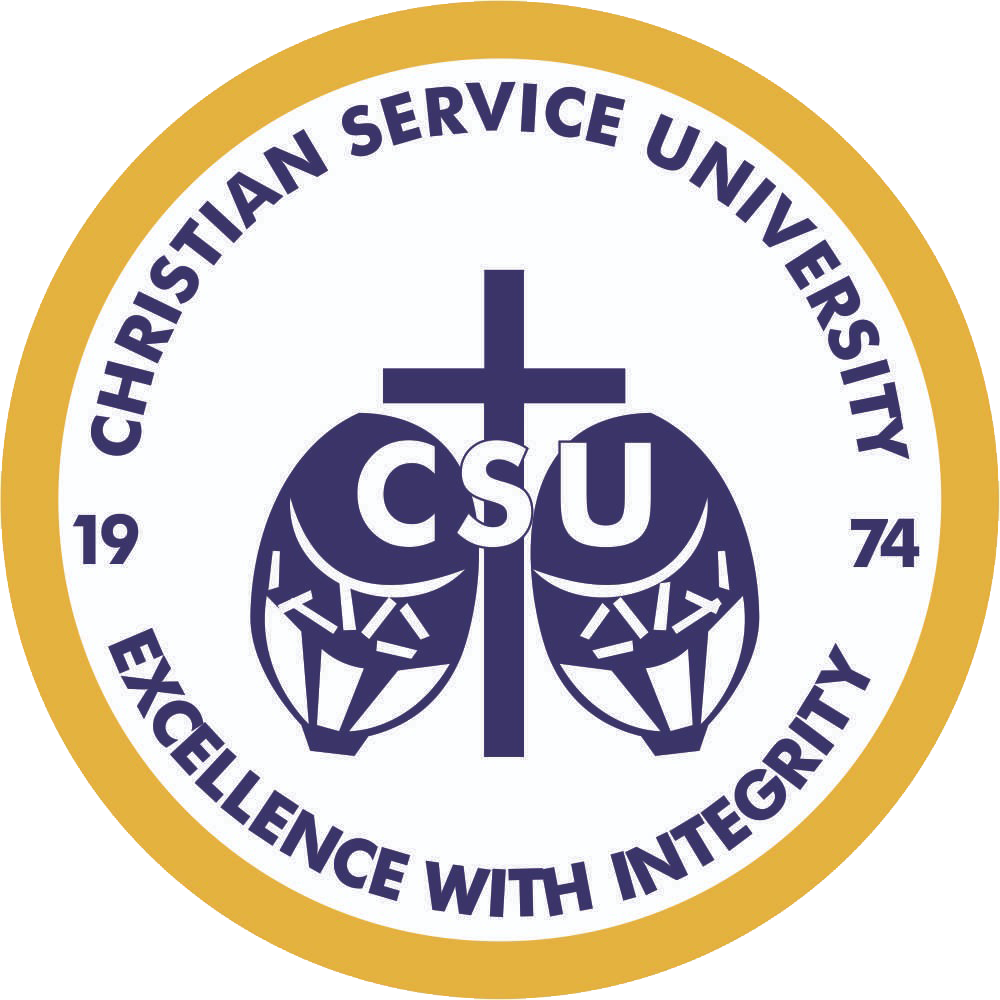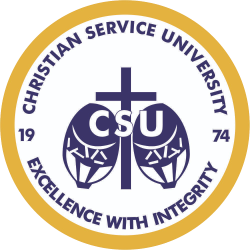Welcome Message

The goal of the BA Planning and Social Development Programme is to produce highly qualified professional social development workers/practitioners and managers who will be able to apply the knowledge, skills, and enterprise acquired to provide development linkages meetfelt needs, and manage crises and relationships of individuals, groups, organisations, and institutions in the social sector: in view of the neglect over the years of social dimensions of development.
Programme Objectives
The objectives of the Programme are that by the end of the training, the social development worker/practitioner will be able to:
- Understand planning and social development as a process of transformation involving structural, attitudinal, social and institutional changes as well as poverty and creating safety nets for the vulnerable.
- Understand the role of the Christian faith in social development as seeking a decent and dignified living by restoring relationships with God, self, others, the environment, and the community at large.
- Demonstrate ability to use social assessment tools to identify problems/needs, formulate plans, translate plans into practical social development projects, and mobilise required resources for implementation, monitoring, evaluation and re-planning.
- Demonstrate ability to make critical assessment of social development issues and their practical application to social, cultural, environmental, scientific, and technological problems of communities.
- Use the social development approach, process, and interventions including training and education, participation, empowerment, advocacy, learning, seminar, workshop, and forum to bring about improvement in the quality of life of individuals, groups, families, and communities.
- Promote effective political-technical-communal consultation and dialogue that provide an enabling environment for community development.
- Apply appropriate social development ethics, cultural and religious sensitivity, communication forms and styles in dealing with clients in social development work.
- Integrate academic pursuit with moral and spiritual guidance and counselling that promotes character formation in mobilising and managing human, material, and financial resources for development.
Courses
First Year: Level 100 First Semester
| Course Code
|
Course Title | Credit Hours | ||
| T | P | C | ||
| DPSD 101 | Introduction to Sociology | 3 | 0 | 3 |
| DPSD 103 | Functional French for the Social Development Worker | 2 | 0 | 2 |
| DPSD 105 | Principles of Microeconomics | 3 | 0 | 3 |
| CSUC 101 | Writing Skills I | 3 | 0 | 3 |
| CSUC105 | Morality and Social Values in Africa | 2 | 0 | 2 |
| CSUC 103 | Basic Computer Literacy I | 2 | 3 | 3 |
| Total | 16 | 3 | 16 | |
First Year: Level 100 Second Semester
| Course Code
|
Course Title | Credit Hours | ||
| T | P | C | ||
| DPSD 102 | Introduction to Development Communication | 2 | 0 | 2 |
| DPSD 104 | Fundamentals of Planning | 3 | 0 | 3 |
| DPSD 106 | Principles of Macroeconomics | 3 | 0 | 3 |
| CSUC 102 | Writing Skills II | 3 | 0 | 3 |
| CSUC 104 | Basic Computer Literacy II | 2 | 3 | 3 |
| CSUC 108 | Introduction to Biblical Studies | 3 | 0 | 3 |
| Total | 18 | 3 | 17 | |
Second Year: Level 200 First Semester
| Course Code
|
Course Title | Credit Hours | ||
| T | P | C | ||
| DPSD 201 | Livelihood Improvement Strategies | 3 | 0 | 3 |
| DPSD 203 | Human Settlement Systems | 3 | 0 | 3 |
| DPSD 205 | Economy of Ghana | 3 | 0 | 3 |
| DPSD 207 | Quantitative Methods | 3 | 0 | 3 |
| DPSD 209 | Theories of Social Development | 3 | 0 | 3 |
| DPSD 211 | Christian and Social Development Ethics | 3 | 0 | 3 |
| Total | 18 | 0 | 18 | |
Second Year: Level 200 Second Semester
| Course Code
|
Course Title | Credit Hours | ||
| T | P | C | ||
| DPSD 202 | Resource Mobilisation for Social Development | 3 | 0 | 3 |
| DPSD 204 | Geographic Information System | 2 | 3 | 3 |
| DPSD 206 | Techniques of Social Analysis | 3 | 0 | 3 |
| DPSD 208 | Development and Management of NGOs/CSOs/CBOs | 3 | 0 | 3 |
| DPSD 210 | Social Policy Planning | 3 | 0 | 3 |
| DPSD 212 | Neighbourhood Design for social development | 3 | 0 | 3 |
| Total | 17 | 3 | 18 | |
Third Year: Level 300 First Semester
| Course Code
|
Course Title | Credit Hours | ||
| T | P | C | ||
| DPSD 301 | Project Planning and Management | 3 | 0 | 3 |
| DPSD 303 | Rural Social Development Workshop | 2 | 6 | 4 |
| DPSD 305 | Social Infrastructure and Services I | 3 | 0 | 3 |
| DPSD 307 | Environmental Management | 3 | 0 | 3 |
| DPSD 309 | Population Analysis | 3 | 0 | 3 |
| DPSD 311 | Research Methods I | 3 | 0 | 3 |
| Total | 20 | 6 | 19 | |
Third Year: Level 300 Second Semester
| Course Code
|
Course Title | Credit Hours | ||
| T | P | C | ||
| DPSD 302 | Corporate Social Responsibility | 3 | 0 | 3 |
| DPSD 304 | Urban Development Workshop | 2 | 6 | 4 |
| DPSD 306 | Social Infrastructure and Services II | 3 | 0 | 3 |
| DPSD 308 | Management Information Systems | 3 | 0 | 3 |
| DPSD 310 | Community participation | 3 | 0 | 3 |
| DPSD 312 | Research Methods II | 3 | 0 | 3 |
| Total | 17 | 6 | 19 | |
Fourth Year: Level 400 First Semester
| Course Code
|
Course Title | Credit Hours | ||
| T | P | C | ||
| DPSD 401 | Transportation Planning | 3 | 0 | 3 |
| DPSD 403 | Sectoral Development Management Workshop I | 3 | 6 | 5 |
| DPSD 405 | Urban Land Development Process | 3 | 0 | 3 |
| DPSD 407 | Project Work I | 1 | 9 | 4 |
| DPSD 409 | Legal Dimensions of Social Development | 3 | 0 | 3 |
| Total | 13 | 15 | 18 | |
Fourth Year: Level 400 Second Semester
| Course Code
|
Course Title | Credit Hours | ||
| T | P | C | ||
| DPSD 402 | Social Advocacy Theories and Methods | 3 | 0 | 3 |
| DPSD 404 | Sectoral Development Management Workshop II | 3 | 6 | 5 |
| DPSD 406 | Planning Practice and Administration | 3 | 0 | 3 |
| DPSD 408 | Project Work II | 1 | 9 | 4 |
| DPSD 410 | Entrepreneurship and Innovation | 3 | 0 | 3 |
| Total | 13 | 15 | 18 | |
Career Prospects
Graduates can look forward to good job prospects at the following institutions:
- Ministries, Departments and Agencies (MDAs);
- Metropolitan, Municipal, and District Assemblies (MMDAs);
- Private Sector;
- Non-Governmental Organisations (NGOs); and
- Civil Society Organisations (CSOs), including local churches and para-church organisations
- Self Employment
- Hospitals
- Media houses
- Prison service
- Community policing
- Social responsibility units within cooperate institutions
- Children home/SOS villages
- Social protection institution
Duration
The BA Planning and Social Development Programme is a four (4)-year (48 months) undergraduate programme. The course structure is fashioned along the lines of social dimensions of development.
Admission Requirements
- SSSCE credits (A-D) in six (6) subjects: three (3) electives from the Sciences, Arts, or Business programmes plus three (3) core subjects in English Language, Mathematics, and Integrated Science. Aggregate score should not exceed 24.
- WASSCE credits (A1-C6) in six (6) subjects: three (3) electives from the Sciences, Arts, or Business programmes plus three (3) core subjects in English Language, Mathematics, and Integrated Science. Aggregate score should not exceed 36.
- GCE ‘O’ and ‘A’ Level holders: Candidates should have two (2) G. C. E. ‘A’ Level passes and five (5) GCE ‘O’ Level credits including English Language and Mathematics. Applicants with three (3) ‘A’ Level passes plus a pass in General Paper may be considered for Level 200.
- General Business Certificate Examination (GBCE) with passes in six (6) subjects including English Language and Mathematics, plus Advanced Business Certificate Examination (ABCE) with passes in at least three (3) subjects.
- Post-Diploma and HND Candidates will be assessed on the basis of the curriculum content of their programme in addition to satisfying requirement ≠ 1, and placed at the appropriate level.
- Candidates who possess ACCA part I, CA part II or CIMA part II will be assessed on the basis of the curriculum content of their programme in addition to satisfying requirement ≠ 1, and placed at level 100.
- Mature GCE Candidates: Candidates aged 25 years and above with five (5) credits in the GCE including English Language, Mathematics, and a Science subject.
- Mature SSSCE/WASSCE Candidates: Candidates aged 25 years and above with passes in three (3) core subjects including English Language, Mathematics, and Integrated Science. They will be required to pass an entrance examination in English Language, Mathematics and Introduction to Computing.

